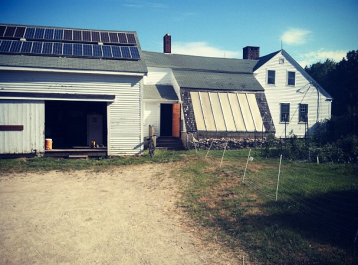I hate this business of saying goodbye. I won’t cushion it with flowery words: I hate it. I am leaving the farm tomorrow morning and I do not want to. Just as I begin to feel at home in this place again, it runs away from me. So it goes.
I suspect that this is one of the nastier parts of “growing up”–the coming and going, the loving and leaving. The finding of home in places different from where you “are from.” Which is ultimately a wonderful, wonderful thing, to feel ownership over a place, to feel that you have a place in a community of individuals.
But at times, the pain of departing makes me wonder why we ever arrive in the first place.
There are moments when it seems fine, when I convince myself that I am separated, aloof, compact and able to control my own emotions. I try to remember that in a few weeks I will be going to college and entering a whole new community. But to be honest, I don’t want to go through it all again–the discomfort, the awkwardness; the feeling as if no one truly knows…who you are. Because though I have only been here for seven weeks this summer, at this moment, Chewonki is where I most feel me. I’m young, but not young enough not to know that that is a rare thing in this scheme of randomness.
I guess I’ve got to suck it up though. Whether we like this business of leaving or not, it happens. Especially “these days” I think. We’re more…nomadic creatures, and particularly young folks, with the way the educational system works. Always moving. The placeless-ness is almost expected–we’re expected to travel and meet new people and share ourselves with many places, which all sounds terribly romantic, and perhaps is…I can’t be sure yet. But what about settling down? What about, well, staying put? Duration, longevity, and commitment to a people and a place. These things I believe we undervalue.
Then again, I know why we arrive. Because it’s better to have love and lost than never loved. It’s better to have come and gone than never come. The pain of leaving is nominal in comparison to the joy we receive while we are in a place–and you know it, because leaving would not hurt nearly so much if it were not so.
Just some thoughts I was thinking on this rainy Sunday afternoon, while I packed my things away.
Yours, Drew
P.S. The infamous Morgan is visiting. We have been adventuring…post to come.












